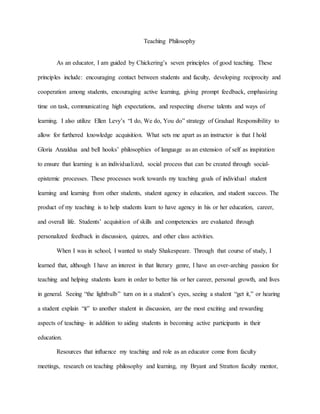
Teaching Philosophy
- 1. Teaching Philosophy As an educator, I am guided by Chickering’s seven principles of good teaching. These principles include: encouraging contact between students and faculty, developing reciprocity and cooperation among students, encouraging active learning, giving prompt feedback, emphasizing time on task, communicating high expectations, and respecting diverse talents and ways of learning. I also utilize Ellen Levy’s “I do, We do, You do” strategy of Gradual Responsibility to allow for furthered knowledge acquisition. What sets me apart as an instructor is that I hold Gloria Anzaldua and bell hooks’ philosophies of language as an extension of self as inspiration to ensure that learning is an individualized, social process that can be created through social- epistemic processes. These processes work towards my teaching goals of individual student learning and learning from other students, student agency in education, and student success. The product of my teaching is to help students learn to have agency in his or her education, career, and overall life. Students’ acquisition of skills and competencies are evaluated through personalized feedback in discussion, quizzes, and other class activities. When I was in school, I wanted to study Shakespeare. Through that course of study, I learned that, although I have an interest in that literary genre, I have an over-arching passion for teaching and helping students learn in order to better his or her career, personal growth, and lives in general. Seeing “the lightbulb” turn on in a student’s eyes, seeing a student “get it,” or hearing a student explain “it” to another student in discussion, are the most exciting and rewarding aspects of teaching- in addition to aiding students in becoming active participants in their education. Resources that influence my teaching and role as an educator come from faculty meetings, research on teaching philosophy and learning, my Bryant and Stratton faculty mentor,
- 2. and my students. I currently participate in semi-monthly faculty meetings that require a reflection on my teaching methods and best practices. The meetings also offer an opportunity to interact with other faculty and to learn from his or her teaching practices, experience, and philosophies. Conducting research on best teaching practices helps me to reflect, revise, and create new ways to act as a conduit for student learning. One of the rules that I follow as a teacher is to always attempt to act in the best interest of the student. Considering student learning styles, modifications, and accommodations is one way that I teach to the best interest of the student. This, in turn, results in more creative teaching, better student retention, and more positive interactions with education for the student. Students should be given the opportunity for success in whatever situation he or she is faced with. As an instructor, I consider my prompt reply time, thorough feedback, availability, and care for student success as my most important characteristics. These characteristics make me a highly effective teacher. I would hope that my students remember me for my characteristics of compassion and for my commitment to his or he success. I encourage students to ask any questions that he or she may have as well as to ask for clarity if he or she does not fully understand what is being asked of them and motivate my students through support and interaction in order to show that their work is valued and valuable. Students not only play an acquiring role in my class, but also a role of creator. Creating, evaluating, and analyzing knowledge, according to Bloom’s Taxonomy of Educational Objectives, helps students to have agency in his or her education and will translate into success in his or her academics and in the workplace.